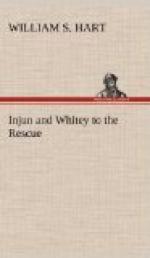But with all his boasted knowledge of his red brothers, what Bill did not know was what Injun was thinking of, and that was something unconnected with his white brothers, or their justice or injustice to his kind. It was something induced by the stillness of the night, following the storm. Thoughts of another night, when Injun was not in a long, narrow bunk-house room, surrounded by booted cowboy friends, but in a tepee, dimly lighted by a central fire, around which squatted his serious-faced, copper-hued kinsmen, smoking their long pipes, and telling of their deeds and mishaps.
And when his mind was fixed on a subject, Injun—like other Indians—was not to be deflected by the thoughts of others. Bill might talk and talk of justice and injustice, or about cows or cartridges; Injun’s mind would stay put, and when he spoke, if it was two hours afterwards, it would be of that night in the tepee.
But it was not that long before the silence that had fallen on the men was broken. Bill was trying to think of another line of argument that would induce Injun to speak at length. Whitey, who knew Injun better than any one else, was looking at him, and realizing that he had something on his mind. “Why don’t you tell us a story, Injun?” Whitey asked.
There was another long pause in the bunk house, and nothing could be heard save the ticking of the alarm clock that was Wong’s special property, on which he relied to give him his three a.m. call to get the punchers’ breakfast ready by sunup. And then Injun spoke, he who rarely talked, save in monosyllables.
“When owl sleep; when thunder don’t beat drum; when wind don’t make noise like big whistle; when trees stand straight up and don’t bend; when everything quick is in hole; when Great Spirit he make sign and everybody him sleep—then I hear my papa tell story about my mamma’s brother; how he get ’um fingers worn off on end. My mamma’s brother him great buck; call him ‘buck’ when him brave, before him made Chief.
“My mamma’s brother him know white man scout, great friend my mamma’s brother. Him talk Indian talk, just like Sioux. My mamma’s brother friend him work for army; him watch when Indian go on war path. Him good man. Him like Indian. Him know Indian no bad.
“My mamma’s brother friend him say to my mamma’s brother him like to bring his friend, White Chief, to Indian war dance. Him say White Chief he no tell what he see. My mamma’s brother he say no: White Chief, with much ribbon on clothes, have crooked tongue. My mamma’s brother friend he say White Chief he no tell; give word before Great Spirit. My mamma’s brother then he say come.”
As the clipped sentences fell in soft gutturals from Injun’s lips his face remained expressionless, except for his eyes, which gazed back into the dim, smoke-laden tepee and into the face of his father, a great story-teller of a race of great story-tellers; a survivor of the age-old days when the deeds and legends of all men were made history by the voice alone. And the men, their wager forgotten, and Whitey, too, leaned forward and saw the tepee and saw Injun’s uncle talking to the scout, whom he trusted, and who trusted the White Chief.




